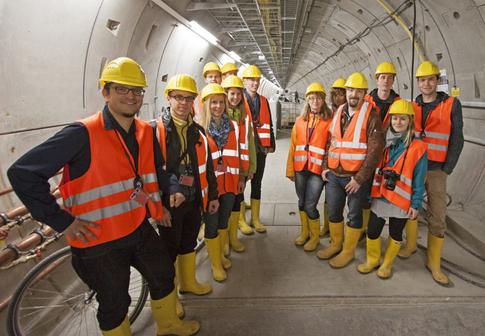XFEL: Freiberg students get a glimpse of European XFEL science
Freiberg students get a glimpse of European XFEL science
European XFEL hosted a rigorous graduate-level university lecture course on materials research using new techniques now available through facilities of this type. From 21 to 25 September, thirteen Master’s and doctoral students from the Technical University of Freiberg (Technische Universität Bergakademie Freiberg) learned in detail about how free-electron lasers work and about the applications of this latest generation of X-ray sources.
Led by European XFEL Scientific Director Serguei Molodtsov, who is also a professor at TU Freiberg, the course “Materialforschung mit Freie-Elektronen Röntgenlasern” covered many new research techniques made possible by X-ray free-electron lasers. In enthusiastic and intensive lectures, European XFEL scientists taught the students about important topics in the field, including “filming” catalytic reactions that are important to many industrial processes, using X-ray microscopy to look into deep into biological structures, probing the basis of magnetism using correlation spectroscopy, and several more. Later in Freiberg, the students will complete final exams on the fundamentals of free-electron laser science as a capstone to the course.
The course also included a visit to the facility’s future experiment hall in Schenefeld as well as two DESY facilities, the synchrotron radiation source PETRA III and the world’s first soft X-ray free-electron laser FLASH. “It’s great how much effort the scientists are giving to let us know about the projects and the possibilities of later doing our own measurements here in Hamburg”, says Tina Nestler, a doctoral student at the Institute for Experimental Physics at TU Freiberg.
“It’s impressive how much planning, simulation, and testing has to happen at such a big project as European XFEL before its operation”, says Sven Jachalke, also a doctoral student at the Institute for Experimental Physics at TU Freiberg. “That is research at the edge of feasibility.”

